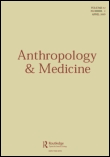
Anthropology & Medicine
Scope & Guideline
Transforming Health Perspectives with Cultural Insights.
Introduction
Aims and Scopes
- Interdisciplinary Exploration of Health and Medicine:
The journal integrates anthropological perspectives with medical practices, fostering a nuanced understanding of health and illness that transcends traditional biomedical approaches. - Focus on Global Health Issues:
It highlights global health challenges, examining how cultural, social, and economic factors influence health outcomes and access to care across different populations. - Critical Examination of Health Policies:
The journal critiques health policies and practices, exploring their implications on marginalized communities and advocating for equitable healthcare solutions. - Emphasis on Lived Experiences of Illness:
Research published in the journal often centers on the personal narratives and lived experiences of individuals dealing with health issues, providing rich ethnographic insights. - Integration of Digital Technologies in Healthcare:
The journal addresses the role of digital technologies in healthcare, exploring how they transform patient care, health communication, and community health initiatives. - Cultural Dimensions of Reproductive Health:
It investigates reproductive health practices and beliefs across cultures, shedding light on the social and ethical considerations surrounding reproductive medicine.
Trending and Emerging
- Digital Health Innovations:
Recent publications increasingly explore the integration of digital technologies in healthcare, particularly in light of the COVID-19 pandemic, highlighting how telehealth and digital care models are reshaping patient experiences. - Mental Health and Well-Being:
There is a growing emphasis on mental health topics, particularly in relation to the impact of migration, chronic illness, and caregiving, reflecting an increased awareness of mental health as a critical component of overall health. - Reproductive Health and Rights:
The journal has seen a rise in discussions around reproductive health, particularly in the context of policy, ethics, and cultural practices, indicating an ongoing commitment to exploring women's health issues. - Health Policy and Governance:
Emerging themes include the examination of health governance and policy frameworks, particularly in relation to equity and access, suggesting a trend towards understanding the complexities of healthcare systems. - Chronic Illness and Care Dynamics:
Papers focusing on chronic illness experiences and the dynamics of care relationships are increasingly prevalent, indicating a shift towards understanding the long-term implications of health conditions on individuals and families.
Declining or Waning
- Traditional Medical Practices:
There has been a noticeable decrease in research focusing on traditional or indigenous medical practices, suggesting a shift towards more contemporary health issues and biomedicine. - Historical Perspectives on Medicine:
Papers exploring historical contexts of medical practices and health systems have become less frequent, indicating a waning interest in historical anthropology as it relates to medicine. - Pharmaceutical Industry Critique:
While the pharmaceutical industry remains a relevant topic, direct critiques of its practices have seen a decline, potentially overshadowed by broader discussions on health systems and policies. - Focus on Non-Western Medical Systems:
Although still important, the emphasis on non-Western medical systems and their practices appears to be decreasing, possibly as the journal pivots towards more globalized health discussions. - Inequities in Global Health:
Although this is a critical area, the specific focus on inequities in global health, particularly in relation to older studies, has diminished, reflecting a broader trend towards integrated health solutions.
Similar Journals
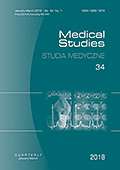
Medical Studies-Studia Medyczne
Connecting global minds for a healthier future.Medical Studies-Studia Medyczne, published by TERMEDIA PUBLISHING HOUSE LTD, is a leading Open Access journal in the field of medicine that aims to advance and disseminate knowledge on various medical subjects. Since its inception as an Open Access publication in 2013, the journal has fostered an inclusive platform for researchers, healthcare professionals, and students from around the globe to share their findings and collaborate on innovative research. With a commitment to excellence, Medical Studies is dedicated to high-quality peer-reviewed articles, providing an essential resource for the medical community and contributing to the dialogue on contemporary health issues. The journal is indexed in several databases, increasing its visibility and impact, thus ensuring that vital medical research reaches a wider audience. Based in Poznań, Poland, the journal encourages submissions from diverse medical disciplines, reflecting the multidisciplinary nature of contemporary healthcare challenges.
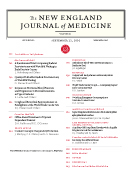
NEW ENGLAND JOURNAL OF MEDICINE
Advancing the Frontiers of Medical KnowledgeThe New England Journal of Medicine (NEJM), published by the Massachusetts Medical Society, stands as a beacon of excellence in the field of medicine. With an impressive impact factor and a prestigious rank of #2 out of 636 in General Medicine, NEJM is recognized in the Q1 category for its significant contributions to medical research and clinical practice since its inception in 1945. The journal is renowned for publishing groundbreaking studies, reviews, and commentaries that influence clinical guidelines and healthcare policies worldwide. While the journal is not open access, it provides pivotal resources that are essential for researchers, healthcare professionals, and students looking to stay abreast of the latest developments in medicine. With a commitment to advancing medical knowledge, NEJM plays a crucial role in bridging the gap between laboratory research and clinical application.
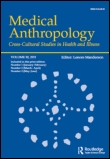
Medical Anthropology
Illuminating the Interplay of Society and Medical PracticesMedical Anthropology is a premier journal dedicated to exploring the intersections of health, culture, and society through an anthropological lens. Established in 1977 and published by Routledge Journals, Taylor & Francis Ltd, this influential journal serves as a vital platform for researchers and practitioners to disseminate groundbreaking studies that address contemporary health issues. With an impressive Impact Factor and recognized as Q1 in Anthropology and Q2 in Health (social science) for 2023, it is well-regarded within the academic community, illustrated by its Scopus Ranks placing it in the top percentile of its fields. Although it does not currently offer open access options, the journal remains an essential resource for those looking to deepen their understanding of medical practices, societal health disparities, and the cultural underpinnings of health behaviors. Publishing regular issues through 2024, Medical Anthropology continues to shape the discourse in the fields of anthropology and health sciences, making it a must-read for students, researchers, and professionals committed to innovation and impact in health-related research.

SSM-Qualitative Research in Health
Uncovering the complexities of health through qualitative lenses.SSM-Qualitative Research in Health, published by Elsevier, is an innovative open-access journal dedicated to advancing the field of qualitative research within health and social sciences. With an ISSN of 2667-3215 and an E-ISSN of the same number, this journal has quickly established itself since its inception in 2021, achieving a commendable Q2 ranking in Health (Social Science) and a Q1 ranking in Social Sciences (Miscellaneous) by 2023. Located in the United Kingdom with its publishing office in Amsterdam, the journal aims to provide a platform for researchers, professionals, and students to explore and publish impactful qualitative studies that address the complexities of health issues through rich narrative and contextual understanding. With a focus on fostering interdisciplinary dialogue and innovation, SSM-Qualitative Research in Health is positioned as an essential resource for those seeking to deepen their insights and contribute meaningfully to the conversation surrounding health and social science research.
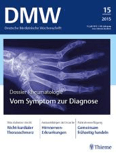
DEUTSCHE MEDIZINISCHE WOCHENSCHRIFT
Connecting practitioners with the latest clinical insights.DEUTSCHE MEDIZINISCHE WOCHENSCHRIFT, published by GEORG THIEME VERLAG KG, is a prominent journal in the field of general medicine, with a storied history dating back to 1875. With an ISSN of 0012-0472 and an E-ISSN of 1439-4413, this journal serves as a vital resource for medical professionals and researchers seeking to stay informed on the latest developments and research in medicine. As of 2023, it holds a Q4 ranking in the category of Medicine (Miscellaneous) and is positioned within the 40th percentile among its peers in general medicine, highlighting its relevance within the academic community. While not an open-access journal, DEUTSCHE MEDIZINISCHE WOCHENSCHRIFT offers readers access to a diverse range of articles that encompass clinical studies, systematic reviews, and opinion pieces geared towards enhancing medical practice and research. Located in Stuttgart, Germany, the journal continues to contribute to the advancement of medical knowledge and serves as an indispensable tool for scholars and practitioners alike.
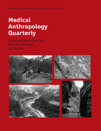
MEDICAL ANTHROPOLOGY QUARTERLY
Exploring the Intersections of Health and CultureMedical Anthropology Quarterly is a premier academic journal published by Wiley, dedicated to advancing the interdisciplinary field of medical anthropology. With an ISSN of 0745-5194 and an e-ISSN of 1548-1387, this highly esteemed journal encompasses a wide array of topics at the intersection of health, culture, and society, reflecting the complexities of medical practices across diverse populations. As a testament to its impact, it boasts a Q1 ranking in Anthropology and a strong performance in related fields, landing at #37 in Social Sciences Anthropology according to Scopus rankings, placing it in the top 92nd percentile of its category. Published quarterly, Medical Anthropology Quarterly serves as a critical platform for researchers, professionals, and students alike, fostering rigorous academic discourse and providing insights relevant to contemporary health issues. While it does not offer open access options, the journal's wide circulation and esteemed reputation make it an invaluable resource for anyone engaged in the study of health and culture. Join the ongoing scholarly conversation that shapes our understanding of health in a global context, as we continue to explore the dynamic interplay between medical practices and human experiences.
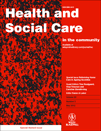
HEALTH & SOCIAL CARE IN THE COMMUNITY
Advancing interdisciplinary dialogue for impactful health solutions.HEALTH & SOCIAL CARE IN THE COMMUNITY, published by WILEY-HINDAWI, is a prominent journal in the fields of health policy, public health, social sciences, and social work, reflecting its broad academic appeal and comprehensive scope. With an impressive categorization in Q1 for Sociology and Political Science and Q2 rankings across various health-related fields, the journal serves as a vital resource for researchers, practitioners, and students dedicated to advancing knowledge in health and social care domains. Since its inception in 1993, it has consistently promoted high-quality, peer-reviewed articles that tackle contemporary issues, ensuring its relevance and impact in our rapidly evolving society. While the journal is accessible through subscription, it stands out for its commitment to disseminating crucial research findings which are pivotal to establishing effective practices and policies in health and social care. As it approaches its convergence into 2024, the journal continues to be a key player in supporting interdisciplinary dialogue and fostering research that influences real-world change.
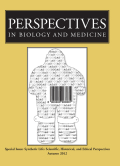
PERSPECTIVES IN BIOLOGY AND MEDICINE
Cultivating Interdisciplinary Perspectives for ProgressPERSPECTIVES IN BIOLOGY AND MEDICINE, published by the esteemed Johns Hopkins University Press, has been a cornerstone of interdisciplinary dialogue since its inception in 1957. With a rich history spanning over six decades, this journal delves into the multifaceted interactions between biology and medicine, offering insights that are vital for health policy, ethics, and the philosophy of science. Recognized for its impact, it holds a Q2 ranking in the History and Philosophy of Science category and Q3 rankings in several other relevant fields as of 2023. While not an open-access publication, it provides critical analyses and discussions that are indispensable for researchers, professionals, and students alike. With its committed editorial team, PERSPECTIVES IN BIOLOGY AND MEDICINE continues to foster scholarly engagement and is poised to shape the future discourse in the biosciences.

NATIONAL MEDICAL JOURNAL OF INDIA
Advancing medical knowledge for a healthier India.NATIONAL MEDICAL JOURNAL OF INDIA, ISSN 2583-150X, is a premier scholarly journal published by SCIENTIFIC SCHOLAR LLC that has been contributing to the field of medicine since its inception in 1988. With a dedicated focus on the diverse aspects of healthcare in India, this journal serves as a vital platform for researchers, healthcare professionals, and students alike, promoting evidence-based practices and innovative findings within the medical community. Although it is currently categorized at Q4 in Medicine (miscellaneous) with a Scopus rank of #449 out of 636, its commitment to fostering local and global discourse on pivotal medical issues and research cannot be understated. The journal’s broad scope and its aim to provide contemporary discussions are crucial in advancing knowledge and improving patient care in varied medical domains. By offering comprehensive access to a wealth of medical research, NATIONAL MEDICAL JOURNAL OF INDIA stands as an essential resource for all stakeholders invested in the development of the medical field in India and beyond.

BMJ-British Medical Journal
Elevating healthcare through impactful research.BMJ-British Medical Journal, published by the esteemed BMJ PUBLISHING GROUP, is a leading academic journal in the field of medicine, specifically categorized within the top Tier Q1 in Medicine (miscellaneous) based on the 2023 rankings. Recognized for its significant impact, BMJ holds an impressive rank of #15 out of 636 in General Medicine, placing it in the 97th percentile among its peers. With a legacy dating back to 1857, this journal continues to foster critical discussions and disseminate high-quality research aimed at advancing clinical practice and healthcare policy. While currently not an open-access journal, its rigorous peer-review process ensures that every publication meets the highest standards of scientific integrity and relevance. Situated in the heart of London at the British Medical Association House, the BMJ remains an essential resource for researchers, healthcare professionals, and students alike, dedicated to sharing impactful findings and innovative medical insights.